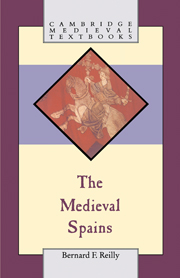Book contents
- Frontmatter
- Contents
- Maps
- 1 At the edge of empire
- 2 The Germanic kingdom in Iberia, 569–711
- 3 Iberia and the dār-al-Islam, 711–1009
- 4 Christian reconquista and African Empire, 1009–1157
- 5 The definition of Iberian autonomy: 1157–1295
- 6 The evolution of the medieval order in Iberia
- 7 The passing of medieval Iberia, 1248–1474
- An introductory bibliography
- Index
- Cambridge Medieval Textbooks
6 - The evolution of the medieval order in Iberia
Published online by Cambridge University Press: 05 June 2012
- Frontmatter
- Contents
- Maps
- 1 At the edge of empire
- 2 The Germanic kingdom in Iberia, 569–711
- 3 Iberia and the dār-al-Islam, 711–1009
- 4 Christian reconquista and African Empire, 1009–1157
- 5 The definition of Iberian autonomy: 1157–1295
- 6 The evolution of the medieval order in Iberia
- 7 The passing of medieval Iberia, 1248–1474
- An introductory bibliography
- Index
- Cambridge Medieval Textbooks
Summary
For the historian the treatment of the fourteenth and fifteenth centuries in Europe presents a series of particularly difficult problems. From the collapse of the Holy Roman Empire in Germany and Italy to the Hundred Years War in France, from the decline of the Plantagenet in England to the tragedies of the Avignonese papacy and the Great Western Schism of the Christian church the period often seems to be one of unrelieved decline that finds a successful issue only in the birth of the modern world about the beginning of the sixteenth century. One, or more even, of these crises and convulsions could be blinked but their concurrence and universality would seem to require a more general explanation which nonetheless continues to elude us. To simply conclude that “time is out of joint” is more satisfying emotionally than intellectually and mystical Spenglerian hypotheses of organic growth and decline in civilizations distance themselves rather too much from the data to be accommodated.
So much, at least, needs to be said by way of context for the Iberian experience of the period. Whatever the possibilities had been for peninsular society at the end of the Roman period, by 1300 it had been increasingly a part of the medieval west for at least four centuries. Its rhythms, from the steady growth of population, to the emergence of Christian dynastic monarchy, to the rebirth of towns, and to the rise of parliaments, had substantially mirrored those of the wider west.
- Type
- Chapter
- Information
- The Medieval Spains , pp. 160 - 189Publisher: Cambridge University PressPrint publication year: 1993



